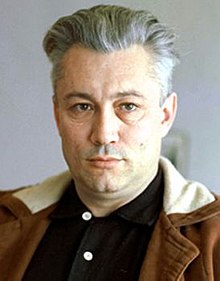Yuri Nagibin
| Yuri Nagibin | |
|---|---|
 |
|
| Born |
April 3, 1920 Moscow, Soviet Union |
| Died | June 17, 1994 (aged 74) Moscow, Russia |
Yuri Markovich Nagibin (Russian: Ю́рий Ма́ркович Наги́бин; April 3, 1920 – June 17, 1994) was a Russian Soviet writer, screenwriter and novelist.
Yuri Nagibin was born in Moscow in 1920. Nagibin's mother Ksenia Nagibina was pregnant with him when his father — Kirill Nagibin, a Russian nobleman — was executed as a counter-revolutionary before he was born. He was raised by a Jewish stepfather Mark Leventhal who was also later arrested and sent into internal exile to the Russian North in Komi Republic in 1927. Nagibin was unaware of his real father, so he assumed he was partly Jewish (Nagibin's mother was of Russian ethnicity). He found out late in life that both of his parents were in fact Russian, but he consciously related himself to Jews and condemned antisemitism, having suffered many antisemitic incidents in his early life.
In 1938 he entered the Moscow State Medical University, but left it for VGIK. He wrote his first story in 1940 and soon became a member of the Union of Soviet Writers. World War II terminated his education. In 1942 he joined the Red Army. «My knowledge of German language determined my war specialty. I was sent to the 7th department of the Main Political Directorate of the Soviet Army — which meant counterpropaganda. I served as a counterpropagandist and political instructor, my rank equaled to that of a lieutenant. First the Volkhov Front, the Leningrad Front, then I was sent to the Voronezh Front». After a serious contusion he returned to the front as a war correspondent. In 1943 he published his first collection of stories.
Nagibin was one of the most prolific Soviet screenplay writers, but he also wrote several novels and novellas, as well as many short stories and newspaper articles. Among the topics he explored was the Great Patriotic War, the life of simple people after the war, his childhood memories, village prose, ecological themes and Russian history. He traveled a lot — both inside and outside of the USSR, which also influenced his writings. Nagibin is known for his The Red Tent novel based on the history of Umberto Nobile's expedition to the North Pole. It was later adapted by him for the film of the same name (heavily rewritten during the filming process). He also co-wrote the screenplay for the Soviet-Japanese movie Dersu Uzala directed by Akira Kurosawa which received an Oscar for the Best Foreign Language Film in 1976.
...
Wikipedia
